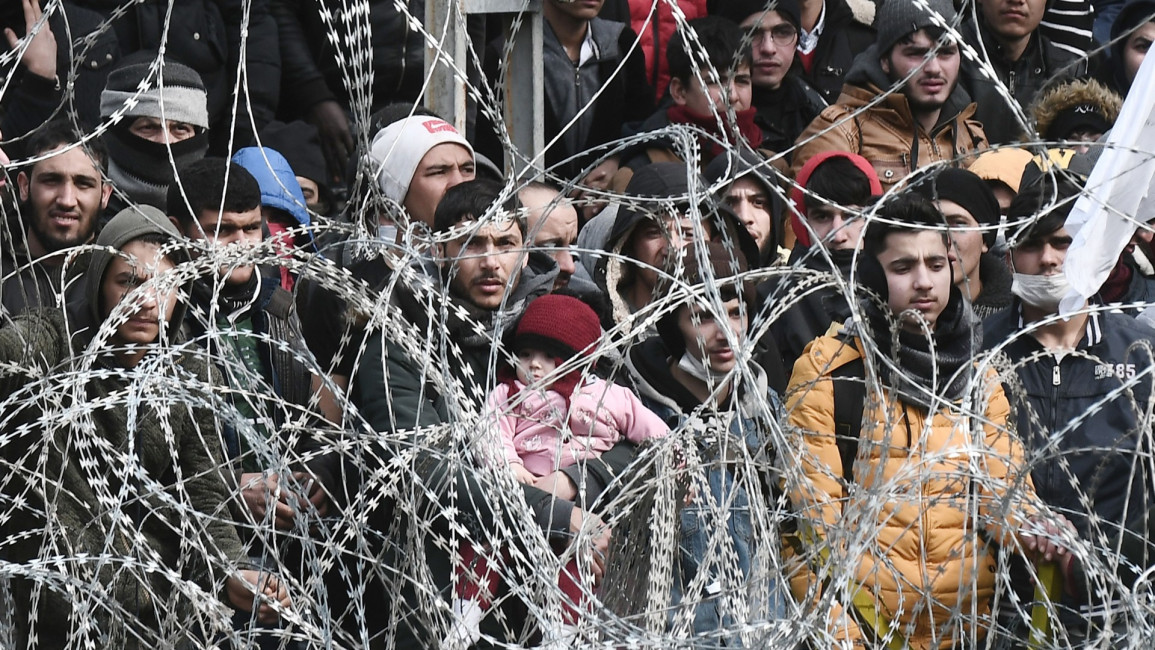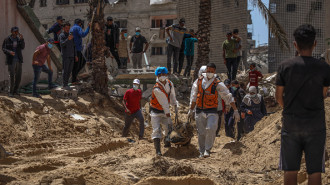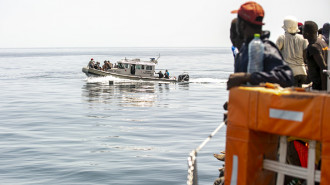HRW urges Greece to investigate expulsions after harrowing accounts of Syrian, Palestinian asylum seekers
HRW urges Greece to investigate expulsions after harrowing accounts of Syrian, Palestinian asylum seekers
Human Rights Watch is calling on Greece to investigate forced expulsion of asylum seekers at the Turkish border.
3 min read
HRW is calling on Greece to investigate its processes [Getty]
Greek law enforcement officers have forcibly returned asylum seekers and migrants at the land and sea borders with Turkey during the coronavirus lockdown, endangering hundreds, according to Human Rights Watch.
Officers reportedly used violence against asylum seekers, including some who were inside Greek territory, and often destroyed the migrants’ belongings.
Human Rights Watch reviewed nine cases and “found no evidence that authorities took any precautions to prevent the risk of transmission of Covid-19 to or among the migrants while in their custody”.
The findings add to growing evidence of abuse collected by NGOs and the media involving hundreds of people pushed back from Greece to Turkey by either Greek law enforcement officers or unidentified masked men over the last couple of months.
Such pushback actions violate several human rights laws, including against collective expulsion under the European Convention on Human Rights.
“Greek authorities did not allow a nationwide lockdown to get in the way of a new wave of collective expulsions, including from deep inside Greek territory,” said Eva Cossé, Greece researcher at Human Rights Watch.
“Instead of protecting the most vulnerable people in this time of global crisis, Greek authorities have targeted them in total breach of the right to seek asylum and in disregard for their health.”
The organisation interviewed 13 victims and witnesses who described incidents in which the Greek police, the Greek Coast Guard, and unidentified men in black or commando-like uniforms who appeared to be working with the authorities, violently pushed migrants back to Turkey in March and April 2020, at the height of global covid-19 lockdown measures.
Six asylum seekers, from Syria, Palestine, and Iran, including a 15-year-old unaccompanied girl from Syria, described three incidents in March and April in which Greek Coast Guard personnel, Greek police, and armed masked men in dark clothing coordinated and carried out summary returns to Turkey from the Greek islands of Rhodes, Samos, and Symi.
Six of those interviewed said Greek police officers rounded up people in the Diavata camp for asylum seekers in Thessaloniki, 400 kilometers from the land border with Turkey.
This is the first time Human Rights Watch has documented collective expulsions of asylum seekers from deep inside Greece, through the Evros river.
All of them said they were picked up on the islands soon after they landed, placed on larger Coast Guard boats, and once they were back at the sea border, were forced onto small inflatable rescue rafts, with no motor, and cast adrift near Turkish territorial waters.
Marwan (a pseudonym), 33, from Syria, said that on March 8, the Greek Coast Guard engaged in life-threatening maneuvers to force the small boat carrying him and 22 other passengers, including women and children, back to Turkey:
“[W]e saw a Greek Coast Guard boat. It was big and had the Greek flag on it…. They started pushing back our boat, by creating waves in the water making it hard for us to continue…. It was like a battle – like living in Syria, we thought we were going to die.”
Those who were interviewed said Greek security forces stripped them of their clothes, leaving them in either just their underwear or just a basic layer, and took their possessions, including personal identification documents, money, telephones, and bags before pushing them back to Turkey.
Officers reportedly used violence against asylum seekers, including some who were inside Greek territory, and often destroyed the migrants’ belongings.
Human Rights Watch reviewed nine cases and “found no evidence that authorities took any precautions to prevent the risk of transmission of Covid-19 to or among the migrants while in their custody”.
The findings add to growing evidence of abuse collected by NGOs and the media involving hundreds of people pushed back from Greece to Turkey by either Greek law enforcement officers or unidentified masked men over the last couple of months.
Such pushback actions violate several human rights laws, including against collective expulsion under the European Convention on Human Rights.
“Greek authorities did not allow a nationwide lockdown to get in the way of a new wave of collective expulsions, including from deep inside Greek territory,” said Eva Cossé, Greece researcher at Human Rights Watch.
“Instead of protecting the most vulnerable people in this time of global crisis, Greek authorities have targeted them in total breach of the right to seek asylum and in disregard for their health.”
The organisation interviewed 13 victims and witnesses who described incidents in which the Greek police, the Greek Coast Guard, and unidentified men in black or commando-like uniforms who appeared to be working with the authorities, violently pushed migrants back to Turkey in March and April 2020, at the height of global covid-19 lockdown measures.
|
Six asylum seekers, from Syria, Palestine, and Iran, including a 15-year-old unaccompanied girl from Syria, described three incidents in March and April in which Greek Coast Guard personnel, Greek police, and armed masked men in dark clothing coordinated and carried out summary returns to Turkey from the Greek islands of Rhodes, Samos, and Symi.
Six of those interviewed said Greek police officers rounded up people in the Diavata camp for asylum seekers in Thessaloniki, 400 kilometers from the land border with Turkey.
This is the first time Human Rights Watch has documented collective expulsions of asylum seekers from deep inside Greece, through the Evros river.
All of them said they were picked up on the islands soon after they landed, placed on larger Coast Guard boats, and once they were back at the sea border, were forced onto small inflatable rescue rafts, with no motor, and cast adrift near Turkish territorial waters.
Marwan (a pseudonym), 33, from Syria, said that on March 8, the Greek Coast Guard engaged in life-threatening maneuvers to force the small boat carrying him and 22 other passengers, including women and children, back to Turkey:
“[W]e saw a Greek Coast Guard boat. It was big and had the Greek flag on it…. They started pushing back our boat, by creating waves in the water making it hard for us to continue…. It was like a battle – like living in Syria, we thought we were going to die.”
Those who were interviewed said Greek security forces stripped them of their clothes, leaving them in either just their underwear or just a basic layer, and took their possessions, including personal identification documents, money, telephones, and bags before pushing them back to Turkey.



